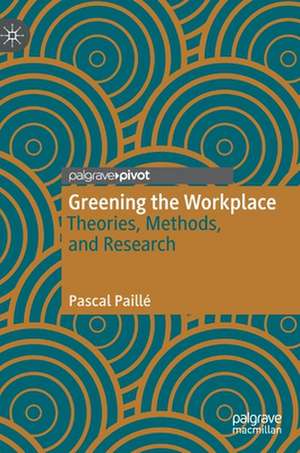Greening the Workplace: Theories, Methods, and Research
Autor Pascal Pailléen Limba Engleză Hardback – 18 oct 2020
Preț: 419.81 lei
Nou
Puncte Express: 630
Preț estimativ în valută:
80.33€ • 84.08$ • 66.86£
80.33€ • 84.08$ • 66.86£
Carte tipărită la comandă
Livrare economică 31 martie-14 aprilie
Preluare comenzi: 021 569.72.76
Specificații
ISBN-13: 9783030583873
ISBN-10: 3030583872
Pagini: 162
Ilustrații: VII, 162 p. 6 illus.
Dimensiuni: 148 x 210 mm
Greutate: 0.38 kg
Ediția:1st ed. 2020
Editura: Springer International Publishing
Colecția Palgrave Pivot
Locul publicării:Cham, Switzerland
ISBN-10: 3030583872
Pagini: 162
Ilustrații: VII, 162 p. 6 illus.
Dimensiuni: 148 x 210 mm
Greutate: 0.38 kg
Ediția:1st ed. 2020
Editura: Springer International Publishing
Colecția Palgrave Pivot
Locul publicării:Cham, Switzerland
Cuprins
Chapter 1. Introduction .- Chapter 2. Key issues, Evidence and Human Activities.- Chapter 3. Employee Environmental Behaviors.- Chapter 4. The Question of Non-Environmental Behaviors.- Chapter 5. Theoretical approaches.- Chapter 6. The Question of Organizational Boundaries.- Chapter 7. Employees and Pro-Environmental Behaviors: Obstacles, Constraints and Barriers.- Chapter 8. Greening the Workplace Through Employees: An Integrative Model.- Chapter 9. Greening the Workplace through Practices and Behavioral Intervention.
Notă biografică
Pascal Paillé is Full Professor and Head of the People & Organization Department at Neoma Business School, France. His research and teaching focus on sustainable human resource management. Paillé has published more than 80 research papers in leading journals (Journal of Business Ethics, Journal of Business Research, Organization and Environment, International Journal of Human Resource Management, and the Journal of Environmental Psychology, among others), 15 book chapters, and 3 books. He also has served as Editor-in-Chief of the International Journal of Environment, Workplace, and Employment (2015-2019).
Textul de pe ultima copertă
Pascal Paillé is Full Professor and Head of the People & Organization Department at Neoma Business School, France. His research and teaching focus on sustainable human resource management. Paillé has published more than 80 research papers in leading journals (Journal of Business Ethics, Journal of Business Research, Organization and Environment, International Journal of Human Resource Management, and the Journal of Environmental Psychology, among others), 15 book chapters, and 3 books. He also has served as Editor-in-Chief of the International Journal of Environment, Workplace, and Employment (2015-2019).
The phrase “greening of the workplace” refers to the range of resources used by an organization to ensure its management and industrial processes are conducive to the adoption of workplace pro-environmental behaviors by its employees, irrespective of their position, the nature of their work or their rank within the organization. This book provides greater visibility to research into how organizations encourage their employees to take environmental considerations into account in their daily work. It examines the connections between organizational practices, individual behaviors, and environmental performance. This book will appeal to HRM scholars interested in the psychological, managerial and organizational dimensions governing the relationship between individuals and ecology.
Caracteristici
Provides a summary of research on the greening of workplaces by establishing connections between the management and human sciences with a view to addressing environmental questions Examines how individual commitment and engagement contribute to reducing the total ecological footprint of an organization Presents a new model of (non)environmental behaviors based on individual decision-making
